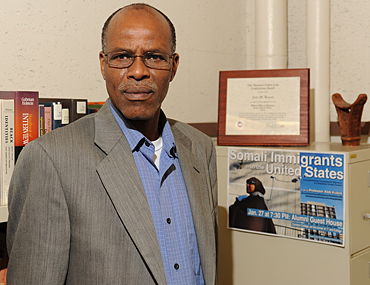Iowa State sociologist, migration researcher assesses the current crisis in Somalia
08-29-11

Abdi Kusow, an associate professor of sociology, is researcher and author on Somalia and the Somali Diaspora. Photo by Bob Elbert, ISU News Service (download print quality photo)
Contacts:
Abdi Kusow, Sociology, 515-294-3128, kusow@iastate.edu
Nick Vanberkum, Sociology, 515-294-2179, nvanberk@iastate.edu
Mike Ferlazzo, News Service, 515-294-8986, 515-450-2908 (c),
ferlazzo@iastate.edu
Iowa State sociologist, migration researcher assesses the current crisis in Somalia
AMES, Iowa -- The images of starving children and violence caused by famine and political unrest in Somalia are horrific. They painfully hit home with Abdi Kusow, who was born and raised in the African nation.
Now an associate professor of sociology at Iowa State University, Kusow continues to follow the events in Somalia closely as a researcher and author on Somalia and the Somali Diaspora. He's authored or edited three books and numerous journal articles on the topic.
CNN reports that the current crisis finds some 3.7 million Somalis -- almost half the country's population -- in need of emergency relief, and more than 750,000 now in refugee camps in neighboring countries. Kusow is well aware of the gravity of the situation and recommends the international community attack it in two ways.
"There are two parallel approaches to this kind of a problem, whether it's in Somalia, or any other place," said Kusow, who has consulted with several international organizations, including the United Nations Education, Scientific, and Cultural Organization. "The first point is to obviously figure out how best to help the people who are in immediate danger.
"The second point is really how to make sure that some kind of political and social infrastructure is put in place so that a repeat does not occur," he continued. "This is even more important than the initial relief operation."
Second epic tragedy in 20 years
Kusow said this is the second time in 20 years that Somalia and its people have been faced with this kind of epic tragedy. The other one resulted in the relief effort, "Operation Restore Hope," in 1992.
Famine has already taken the lives of more than 29,000 children under the age of 5 in the current crisis, according to a CNN report. Compounding the plight of the Somali people is the fact that the country has been beset by corruption and political instability -- led by insurgency from al Shabab, an Islamic group with ties to al-Qaida -- and is experiencing its worst drought in 60 years.
All that has attracted the world's attention again and Kusow hopes that the global response will go beyond providing only immediate relief.
"This awareness will help now, and I'm glad that that's the case," he said. "But I think that this international effort then must be turned into an effort that does not only consider itself with the immediate relief, but in resolving the political crisis in Somalia. In fact, that is what I believe is the interest of all of us in the international community."
A key first step, according to Kusow, is repatriating the massive number of Somalis who have migrated from the country -- particularly to neighboring Ethiopia and Kenya.
"It is very important that our focus has to be on repatriating the people back to their home and providing them with some kind of infrastructure," he said. "Somalis have been in Dabaab [a refugee camp in northern Kenya] for 20 years and if they're in the refugee camp for the next 20 years too, that is not going to help. I think the key strategy would be to bring those people back to their homelands and give them some ways that they can survive."
Repatriating on the local level
Kusow admits that's not going to be easy amid the political unrest and corruption. But it must take place on the local level.
"I think the 'something to go back to' for Somalis can be created by engaging the local communities in the most affected regions, so at least they can allow the people to come back," he said. "The idea of bringing back and finding leadership within refugee camps and bringing them back to their home regions is not only something that helps with the current crisis, but will stabilize the country in the long run.
"Even if the rain comes [ending the drought], in this kind of situation the people don't even have the instruments to go back to their farms and start," Kusow added. "So I think again, it comes back to the idea of how to engage al Shabab and other radical groups in these regions and build the infrastructure for the people to return. One way to engage al Shabab is to appeal to the more moderate voices with its organization and encourage them to allow international aid agencies to go back to the most affected regions."
As U.S. officials address how best to move forward in Somalia, they also need to consider the increasing number of Somali refugees migrating into the U.S. as a result of the crisis. Kusow's forthcoming book addresses the new African Diaspora in Michigan. He also has been invited by the Wisconsin Advisory Committee to the U.S. Commission on Civil Rights to be the keynote speaker at a community forum on civil rights issues confronting the Somali immigrant community on Friday, Sept. 16, in Eau Claire, Wis.
-30-